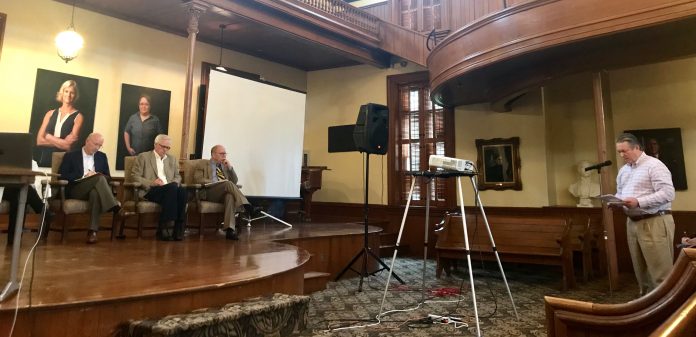
Concerned parents gathered in Meharry Hall on Saturday to discuss Greek life, DePauw’s drinking culture and the role of Public Safety with members of DePauw University’s administration and board of trustees
The forum was requested in an open letter written by Jeff Neal, the parent of a current DePauw student. The letter, which was sent to administration, was signed by over 300 parents and alumni, cited a “dysfunctional relationship with Greek Life organizations, their student members and University administration.”
“DePauw and the Greek community are absolutely joined at the hip, historically, and forever in the future,” board of trustee member Andy Rieth said during the beginning of the open forum between parents and DePauw University administration.
Kathy Vrabeck, president of the board of trustees, opened the forum with a presentation that emphasized high risk behaviors, specifically related to alcohol, on DePauw’s campus. This year there have been 19 hospitalizations, with an average BAC of 0.21 for those incidents. The statistics were used as a reference point throughout the rest of the meeting.
In addition to this, the presentation explained DePauw’s Medical Amnesty Policy and how it is related to violations of DePauw’s Code of Conduct.
The Medical Amnesty Policy provides amnesty for violations of underage or excessive consumption of alcohol. Amnesty is given to any individuals that seek help, the student in need of help and organizations, if the leader is involved in seeking help. However, the policy does not prevent actions being taken for other Code of Conduct violations such as false identification, causing or threatening harm, sexual violence, damage to the property, harassment or hazing.
In order to be granted amnesty, the individuals who seek help must call, cooperate and stay with the individual. In addition, the students must agree to timely completion of an educational follow up and organizations must take steps recommended by Student Academic Life officers.
A Q & A between parents and a panel composed of President Mark McCoy, Vice President Alan Hill and seven board of trustee members followed the presentation.
“I believe our goal today in this session, is that you recognize we're not here simply to lodge a customer complaint,” Neal said.
Many parents mentioned a lack of transparency, inconsistent outcomes and poor communication by the DePauw administration. Several parents also raised concerns over the lack of clear definitions in university policies.
These complaints, according to Neal, have angered, disappointed and frustrated many people. “I submit this should not be happening at arguably the country's most codependent university with its greek organizations,” Neal said.
While McCoy agreed that DePauw and Greek organizations are intertwined, he also referenced just how prevalent high risk drinking is on campus. “Someone told me this, and I have yet to look this up,” McCoy said. “Every semester that we have had a death in America on a college campus from drinking, DePauw that very same semester has reported a higher BAC.”
McCoy then referenced a death that occured in California from a 0.31 BAC and how DePauw reported a student with a 0.47 BAC. “We are incredibly lucky. You can’t work with accidentality like this.”
However, parents focused on the implications of punishing students and organizations for drinking infractions. Many parents voiced their worries that these policies will discourage students from calling for help.
“We're terribly concerned that because of the message that the administration here is sending to the kids, they will not take care of their friends and do the right thing.”
In addition to the Medical Amnesty Policy, other parents pointed out issues with Public Safety. “Public Safety [has] effectively been deputized to enforce compliance rather than provide an environment of safety and act as a positive force for the entire student body.”
Another father spoke of hearing stories of girls staying all night at fraternity houses or taking longer, more unsafe routes to get back to their homes, all out of fear of being caught by public safety.
Other parents agreed, seeing it as part of a broader failure on the part of the university to protect students and encourage a safe drinking culture.
While no conclusions were made at the forum, both sides seemed to share an appreciation for the opportunity to open a dialogue.
“We need every person together on the same team, not dividing yourself, not attacking each other,” McCoy said. “but coming together to say we have this goal.”
